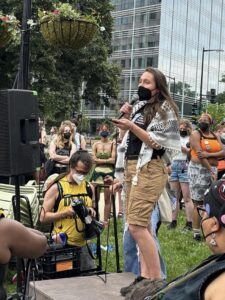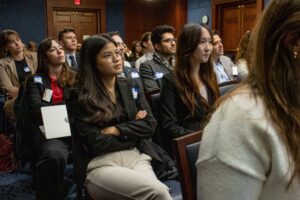Go ahead and Google my name after you read this. Just know the person in those videos isn’t me, even though we look identical.
As the Founder and CEO of the Sexual Violence Prevention Association (SVPA), I’ve been consistently outspoken about the dangers of deepfake pornography. My advocacy made me a victim.
Deepfake pornography is being used to silence, demean, and disempower people with all kinds of political ambitions, particularly women and minorities. Advocates, lawmakers, and political candidates going to bat for legislation that confronts digital sexual violence are especially targeted.
The first of the deepfake attacks against me came when the DEFIANCE Act, a bill I wrote to address and prevent deepfake pornography, was introduced in the Senate on January 30th.
Elated, I went to share the news on Twitter. There it was. There I was. A video of myself. Naked, exposed… penetrated. My excitement was immediately replaced by an overwhelming feeling of violation and fear—exactly the intention of the person who posted this digital rape.
In July, the unanimous passage of the DEFIANCE Act in the Senate came with a resurgence of graphic videos looking just like me. A few months later, the DEFIANCE Act was introduced in the House of Representatives. The following day, another sexually explicit deepfake of me was emailed to my organization. It was considerably more violent than the last and accompanied by the very kind suggestion to “fire that b*tch.” Ironically, it was sent to my inbox. I made the executive decision not to fire myself.
As a victim of sexual violence, my visibility is an asset for solidarity with survivors and advocating for change. But this visibility comes with immense personal risk. What’s sickening is the fact that if the DEFIANCE Act doesn’t pass, there’s nothing I can do to protect myself. Retreating into silence is the only way to make it stop.
As gut-wrenching as these ambushes against me were, their magnitude and violent nature paled in comparison to those experienced by U.S. Representative Alexandria Ocasio-Cortez, who championed the introduction of the DEFIANCE Act in the House. Massive deepfake violations of Ocasio-Cortez were made at every stage of the DEFIANCE Act and after each announcement she posted. Senators Dick Durbin and Lindsay Graham, who championed the bill in the Senate, suffered no such treatment.
Deepfake pornography isn’t a weapon reserved for people of any particular political persuasion. In April, a suggestive deepfake of Republican Representative Lauren Boebert spread rapidly around the internet, provoking outcries from Democrats and Republicans alike.
What makes deepfake pornography such a sinister threat to our democracy is its undeniably bipartisan nature. Those fueling the deepfake pornography fire haven’t limited their aim to members of Congress– deepfake pornography of former president Donald Trump has been circulating the internet for years, including the infamous deepfake of Trump and North Korean leader Kim Jong Un that many of us have seen (and wish we could un-see).
While deepfake pornography clearly knows no party, an obvious pattern is emerging and revealing primary targets.
A recent addition to the list of victimized elected officials is Vice President Kamala Harris who, shortly after announcing her presidential candidacy in July, was attacked with a slew of pornographic and sexually explicit deepfakes. Meanwhile, relatively few explicit deepfakes have been made of President Joe Biden. Deepfake pornography is infesting our political arena, and women and minorities are bearing the brunt of this digital epidemic.
Deepfake pornography looms over the integrity of this year’s election, making it a necessary focal point in the presidential campaign. I am well acquainted with the pressure to remain silent. I am writing this op-ed knowing that I will likely be deepfaked again as a result. But, in the face of silencing, I am being defiant. Harris and Trump must be defiant with me.
We need deepfake pornography to be discussed along the campaign trail. We need it covered on legislative platforms and questioned during interviews. Most importantly, we need action from whoever takes office.







